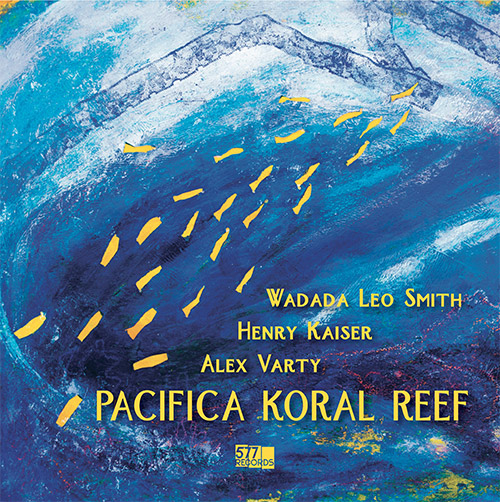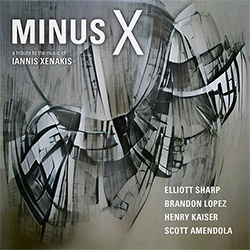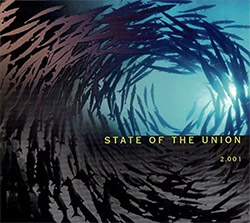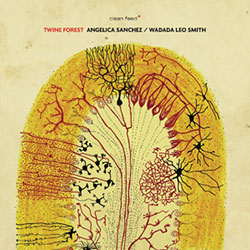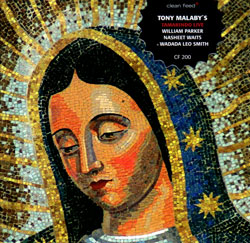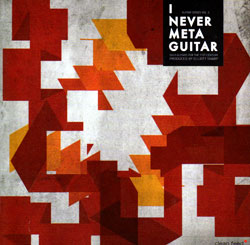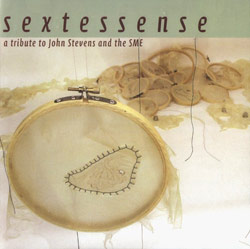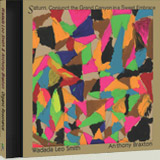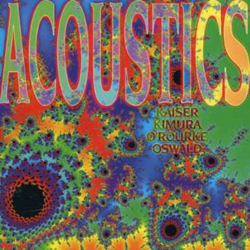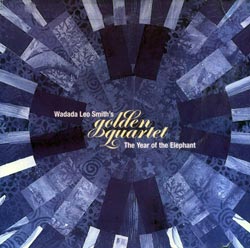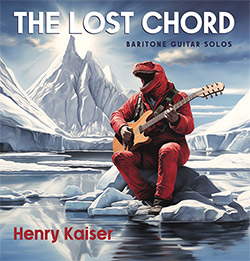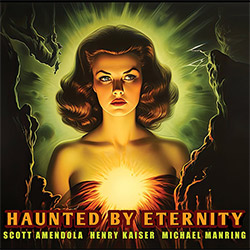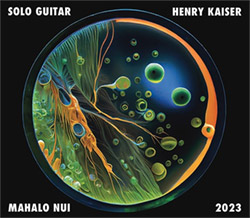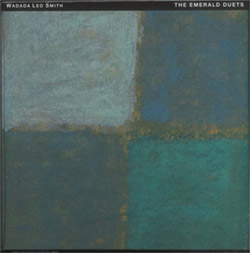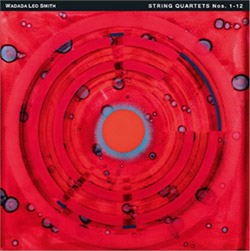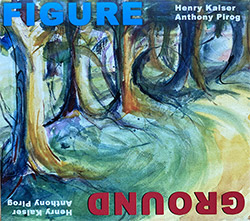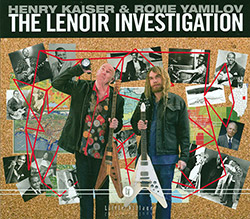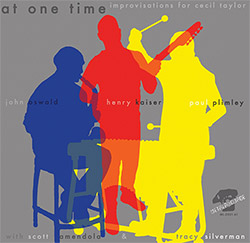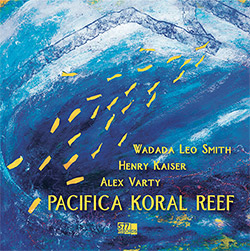
Interpreting trumpeter Wadada Leo Smith's Ankhrasmation graphic score--the term joining the Egyptian symbol for life, the Ethiopian word for leader and the universal term for mother--Smith and guitarists Alex Varty & Henry Kaiser use the rich combination of visual cues and musical notation to record this rapturous and unduplicable album of profound and engaging improvisation.
In Stock
Quantity in Basket: None
Log In to use our Wish List
Shipping Weight: 2.00 units
Sample The Album:
Wadada Leo Smith-trumpet
Henry Kaiser-guitar
Alex Varty-guitar
Click an artist name above to see in-stock items for that artist.
UPC: 755491214503
Label: 577 Records
Catalog ID: CD-577R-5884
Squidco Product Code: 31101
Format: CD
Condition: New
Released: 2021
Country: USA
Packaging: Digipack
Recorded at Wise Acres Studio, in Santa Cruz, California, and Fantasy Studios, in Berkley, California, in Janurary, 2018, by Sandor Nagyszalancy, Jessie Nichols, and Henry Kaiser.
"Trumpeter, composer, educator, and visual artist Wadada Leo Smith is a pioneer in the fields of contemporary jazz and creative music. During the 1960s and early '70s, Smith was based in Chicago, where he was a key member of the Association for the Advancement of Creative Musicians (AACM). Largely recognized as a watershed organization in the history of jazz, the AACM is known for crafting a vibrant dialectic between improvised and formally scored music, and this year celebrates its 50th anniversary. [...]
Ankhrasmation-a neologism formed of "Ankh," the Egyptian symbol for life, "Ras," the Ethiopian word for leader, and "Ma", a universal term for mother-is the systemic musical language that Smith has developed over nearly 50 years. The scores eschew (and at times incorporate) traditional notation in favor of symbolic compositions of color, line, and shape. These provide specific instruction for the seasoned improvisor while allowing musicians to bring their own special expertise and individual strengths to each performance."-The Renaissance Society
"I'm supposed to be writing about Pacifica Koral Reef, this record that I've made with my friend Henry Kaiser and his friend Wadada Leo Smith. And while the music it contains is, for me, a miraculous late-career achievement after 50 years of mostly playing in alternative rock bands, writing about it is a downright odd thing to have to do. In my parallel life as an arts journalist, I've interviewed everyone from Ornette Coleman to John Cage to Robert Plant but I've rarely had to write about myself, and I much prefer it that way. Fighting against my natural tendency towards self-effacement is the fact that Pacifica Koral Reef is more than just a record. Yes, everybody says this about their latest slab of black plastic or their shiny new optical disc, but this time it's true.
Everybody says this, too, but wait.
The multidimensional experience that is Pacifica Koral Reef began life in trumpet player and composer Smith's prodigious imagination, and then found a home on a single sheet of paper, inscribed with sinuous lines, bright blocks of spring green and earthy ochre, radiant pools of blue, circuit-board computations, and ancient glyphs.
You could call it a painting. The University of Chicago's Renaissance Society, which hosted an exhibition of Smith's graphic scores in 2015, probably would.
It's also a portal, as Kaiser and I found when we began, with Smith's inspiration and help, to translate it into sound. Over the course of several recording sessions, made next door to a sumptuous collection of vintage ukuleles and utilizing an array of microphones made of purest Soviet unobtanium, we were transported to locales as dramatically different as a steamy Chicago nightclub, a Third Stream concert hall, the crystalline world under the Antarctic ice, and a lonely Scottish moor (with hints of a lost tanpura droning in the distance).
Tracking the Pacifica Koral Reef score took us out of familiar habits and into new terrain. It sparked music that will never be duplicated, because if we tried we'd of necessity be expressing a different moment, a different feeling. And it strengthened preexisting bonds of friendship and respect. I met Kaiser in 1978, after seeing a poster advertising a concert of "weird guitar music", and Smith perhaps a year after that, when he led a workshop for improvisers in Vancouver. Meanwhile, Henry has collaborated with Leo on a number of projects, most notably three 2-CD sets and two single album releases with their Yo Miles! band. Henry, who has known Leo since 1976, tells me that he thinks of Wadada as the favorite and wise uncle that he never had in his own family.
All of these visions, connections, and relationships are realized through the score. The music is improvised and ephemeral; the effect is intentional, replicable, and lasting.
That's the beauty of Smith's Ankhrasmation system, which combination of visual stimulation, musical notation, and social philosophy that prompts intuition, imagination, and cooperation.
"Ankhrasmation is a musical language, as opposed to a musical notation system," Leo told music journalist Frank J. Oteri in 2011. "The first part, Ankh, comes from the Egyptian cross. Ras comes from the Ethiopian 'head', meaning the leader. And Ma comes from 'mother'....It could be referenced scientifically, according to nature or biology, or it can be referenced according to fantasy, imagination. The only requirement is that the artists that are performing it maintain a high level of sincerity. That's all it requires."
I might argue that Ankhrasmation scores also ask their interpreters to be conscious of the values of "colour, velocity, [and] rhythm". And when, more recently, I asked Leo if he envisioned Ankhrasmation as a way of integrating the eyes, the ears, and the hands of an improviser, or a group of improvisers, he agreed-but gently reminded me that I'd left out another important dimension: "the heart".
I can't speak to the heart that Henry brought to this project, although it's plainly audible here, and he deserves full production credit for guiding Pacifica Koral Reef from improbable notion to elegant product. I won't say much about my own heart, beyond noting that when we entered the studio I'd just had it broken, and you can probably hear this in the bagpipe-raga lament that I play on open-tuned acoustic guitar to kick off the record. But Wadada likes to speak about how his heart, his system, and his music are all connected to the need to not only survive, but thrive under injustice.
Obviously he's talking about the African American experience in the United States-and more. With "African-American culture, the First People in North and Central and South America, the Jewish culture coming out of Asia," he says, "all these things set in motion to wipe us out, they created something inside of us, all of us, that would not allow that to happen....So inside of that collective consciousness is this will to survive and to prosper. That's the word I like to use. And when we look at African Americans, having people in business and in politics and in writing and literature and all these other dynamics of artistic and cultural activity achieve the highest level is just magnificent."
Having been a diver much longer than he has been a musician, Henry is especially aware of the destructive effect of climate change on the coral reef systems that are an essential part of Gaea, the living earth. His many deployments to Antarctica as a working scientific diver for the past 20 years have made him an expert witness to the heartbreaking changes that are happening and accelerating right now. His guitar here reaches with from under-the-polar-ice inspired rhythms and narratives to intertwine with our collective concern for the earth and its elaborately interconnected web of inhabitants.
Snorkelling in the Pacific Northwest's Salish Sea is a daily part of my own summertime routine. Like participating in collective improvisation, it gives me a sense of being part of a larger whole and an awareness that strange beauties await us just below every surface-along with the presence of risk, and evidence of life's fragility.
Wadada brings the magnificent courage of his ancestors to this music. Henry is darting and provocative and deep into the practice of listening. Me, I'm just glad to be a part of the team, and I hope Pacifica Koral Reef brings light, warmth, and otherworldly pleasure to all those who hear it."- Alexander Varty
Get additional information at The Renaissance Society
Artist Biographies
• Show Bio for Wadada Leo Smith "Ishmael Wadada Leo Smith: trumpeter and multi-instrumentalist, composer and improviser has been active in creative contemporary music for over forty years. His systemic music language Ankhrasmation is significant in his development as an artist and educator. Born in Leland, Mississippi, Smith's early musical life began in the high school concert and marching bands. At the age of thirteen, he became involved with the Delta Blues and Improvisation music traditions. He received his formal musical education with his stepfather Alex Wallace, the U.S. Military band program (1963), Sherwood School of Music (1967-69), and Wesleyan University (1975-76). Mr. Smith has studied a variety of music cultures: African, Japanese, Indonesian, European and American. He has taught at the University of New Haven (1975-'76), the Creative Music Studio in Woodstock, NY (1975-'78), and Bard College (1987-'93). He is currently a faculty member at The Herb Alpert School of Music at California Institute of the Arts. He is the director of the African-American Improvisational Music program, and is a member of ASCAP, Chamber Music America, and the Association for the Advancement of Creative Musicians. Mr. Smith's awards and commissions include: MAP Fund Award for "Ten Freedom Summers" (2011), Chamber Music America New Works Grant (2010), NEA Recording Grant (2010), Fellow of the John Simon Guggenheim Memorial Foundation (2009-2010), Other Minds residency and "Taif", a string quartet commission (2008), Fellow of the Jurassic Foundation (2008), FONT(Festival of New Trumpet) Award of Recognition (2008), Jazz Journalists Association Jazz Award (2005), Islamic World Arts Initiative of Arts International (2004), Fellow of the Civitela Foundation (2003), Fellow at the Atlantic Center for the Arts (2001), "Third Culture Copenhagen" in Denmark-presented a paper on Ankhrasmation (1996), Meet the Composer/Lila Wallace-Reader's Digest Commissioning Program (1996), Asian Cultural Council Grantee to Japan (June-August 1993), Meet the Composer/Lila Wallace-Reader's Digest Commissioning Program (1990), New York Foundation on the Arts Fellowship in Music (1990), Numerous Meet the Composer Grants (since 1977), and National Endowment for the Arts Music Grants (1972, 1974, 1981). Mr. Smith's music philosophy Notes (8 Pieces) Source a New. World Music: Creative Music has been published by Kiom Press (1973), translated and published in Japan by Zen-On Music Company Ltd. (1976). In 1981 Notes was translated into Italian and published by Nistri-Litschi Editori. He was invited to a conference of artists, scientists and philosophers "Third Culture Copenhagen" in Denmark 1996, and presented a paper on his Ankhrasmation music theory and notational system for creative musicians. His interview was recorded for Denmark T.V., broadcasted September 1996. Some of the artists Mr. Smith has performed with are : Muhal Richard Abrams, Anthony Braxton, Leroy Jenkins, Roscoe Mitchell, Lester Bowie, Richard Teitelbaum, Joseph Jarman, George Lewis, Cecil Taylor, Andrew Cyrill, Oliver Lake, Anthony Davis, Carla Bley, David Murray, Don Cherry, Jeanne Lee, Milton Campbell, Henry Brant, Richard Davis, Tadao Sawai, Ed Blackwell, Sabu Toyozumi, Peter Kowald, Kazuko Shiraishi, Han Bennink, Misja Mengelberg, Marion Brown, Kazutoki Umezu, Kosei Yamamoto, Charlie Haden, Kang Tae Hwan, Kim Dae Hwan, Tom Buckner, Malachi Favors Magoustous and Jack Dejohnette among many others. Mr. Smith currently has three ensembles: Golden Quartet, Silver Orchestra, and Organic. His compositions have also been performed by other contemporary music ensembles: AACM-Orchestra, Kronos Quartet, Da Capo Chamber Player, New Century Players, San Francisco Contemporary Music Players, Contemporary Chamber Players (University of Chicago), S.E.M. Ensemble, Southwest Chamber Music, Del Sol String Quartet, New York New Music Ensemble, ne(x)tworks, and California E.A.R. Unit. Mr. Smith's music for multi-ensembles has been performed since 1969. "Tabligh" for double-ensemble was performed by Golden Quartet and Classical Persian ensemble at Merkin Concert Hall (2006) and by Golden Quartet and Suleyman Erguner's Classical Turkish ensemble at Akbank Music Festival in Istanbul (2007). His largest work "Odwira" for 12 multi-ensembles (52 instrumentalists) was performed at California Institute of the Arts (March 1995). His Noh piece "Heart Reflections" was performed in Merkin Concert Hall, NY (November 1996)." ^ Hide Bio for Wadada Leo Smith • Show Bio for Henry Kaiser "Henry Kaiser (born September 19, 1952) is an American guitarist and composer, known as an idiosyncratic soloist, a sideman, an ethnomusicologist, and a film score composer. Recording and performing prolifically in many styles of music, Kaiser is a fixture on the San Francisco Bay Area music scene. He is considered a member of the "second generation" of American free improvisers. He is married to Canadian artist Brandy Gale. In 1977, Kaiser founded Metalanguage Records with Larry Ochs (Rova Saxophone Quartet) and Greg Goodman. In 1979 he recorded With Friends Like These with Fred Frith, a collaboration that lasted for over 20 years. In 1983 they recorded Who Needs Enemies, and in 1987 the compilation album With Enemies Like These, Who Needs Friends? They joined with fellow experimental musicians John French, and English folk-rocker Richard Thompson to form French Frith Kaiser Thompson for two eclectic albums, Live, Love, Larf & Loaf (1987) and Invisible Means (1990). In 1999 Frith and Kaiser released Friends and Enemies, a compilation of their two Metalanguage albums along with additional material from 1984 and 1999. In 1991, Kaiser went to Madagascar with guitarist David Lindley. They recorded roots music with Malagasy musicians and discovered music that, he says, "changed us radically and permanently". Three volumes of this music were released by Shanachie under the title A World Out of Time. In 1994 he made a similar trip to Norway, again with Lindley, recording music that was released as Sweet Sunny North (2 volumes, 1994 and 1996). Since 1998, Kaiser has been collaborating with trumpeter Wadada Leo Smith in the "Yo Miles!" project, releasing a series of tributes to Miles Davis's 1970s electric music. This shifting aggregation has included musicians from the worlds of rock (guitarists Nels Cline, Mike Keneally and Chris Muir, drummer Steve Smith), jazz (saxophonists Greg Osby and John Tchicai), avant-garde (keyboardist John Medeski, guitarist Elliott Sharp), and Indian classical music (tabla player Zakir Hussain). Kaiser has appeared on more than 250 albums and scored dozens of TV shows and films, including Werner Herzog's Encounters at the End of the World (2007). He was given a Grammy Award for his work on the Beautiful Dreamer tribute to Stephen Foster. In 2001, Kaiser spent two and a half months in Antarctica on a National Science Foundation Antarctic Artists and Writers Program grant. He has subsequently returned for nine more visits to work as a research diver. His underwater camera work was featured in two Herzog films, The Wild Blue Yonder (2005) and Encounters at the End of the World (2007), which he also produced, and for which he and Lindley composed the score. Kaiser served as music producer for Herzog's Grizzly Man (2005). He was nominated for an Academy Award for his work as a producer on Encounters at the End of the World." ^ Hide Bio for Henry Kaiser • Show Bio for Alex Varty Alex Varty is a guitarist, vocalist, writer and producer, known for his work with John Oswald, Tim Ray, Henry Kaiser and Leo Smith. He's also written liner notes for albums by Evan Parker, Hans Reichel, Tom Cora and Jin Hi Kim. ^ Hide Bio for Alex Varty
5/14/2024
Have a better biography or biography source? Please Contact Us so that we can update this biography.
5/14/2024
Have a better biography or biography source? Please Contact Us so that we can update this biography.
5/14/2024
Have a better biography or biography source? Please Contact Us so that we can update this biography.
Track Listing:
1. Pacifica Koral Reef 55:09
Improvised Music
Jazz
Free Improvisation
NY Downtown & Metropolitan Jazz/Improv
West Coast/Pacific US Jazz
Trio Recordings
Smith, Leo
Graphic Scores
Staff Picks & Recommended Items
Top Sellers for 2021 by Customer Sales
Search for other titles on the label:
577 Records.


